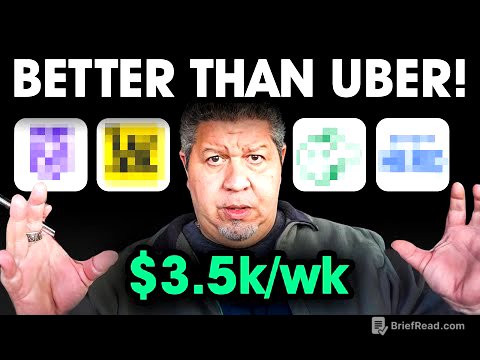TLDR;
This video investigates the impact of Donald Trump's tariff policies on American businesses, workers, and the global economy. It highlights the chaos and uncertainty caused by these policies, featuring interviews with business owners, farmers, economists, and trade experts. The video also explores the potential for corruption and the long-term implications of a trade war with China, including the possibility of escalating geopolitical tensions.
- Trump's tariffs caused market shocks and financial instability.
- Businesses face uncertainty and rising costs due to tariffs.
- Experts warn of potential economic losses and geopolitical risks.
Introduction [0:00]
Donald Trump's long-standing advocacy for tariffs has translated into significant policy changes during his presidency, marked by the introduction of new and revised tariff policies. These actions have reverberated across the globe, creating uncertainty and concern among businesses and markets. The video aims to investigate the real-world impacts of these tariffs, particularly on American workers and businesses, and to assess the broader implications for global trade and stability.
Liberation Day and Market Reaction [2:52]
On April 2nd, Donald Trump announced reciprocal tariffs ranging from 10 to 50% on over 180 countries and territories, bypassing Congress by declaring the trade deficit a national emergency. This "Liberation Day" was followed by slumping stock markets and fears of a recession, exacerbated by a sell-off in the US bond market. The tariffs, enacted through executive orders, were influenced by advisors like Peter Navaro, a radical protectionist.
Peter Navaro and the Pause on Tariffs [6:28]
Peter Navaro, a key architect of Trump's tariff policy, is described as a radical protectionist. Amid panic in the bond markets, Commerce Secretary Howard Lutnik and Treasury Secretary Scott Bessant intervened to persuade Trump to pause his reciprocal tariffs. They removed Navaro from the situation and convinced Trump to announce a pause, which was then portrayed as a strategic move. Trump reduced most reciprocal tariffs to 10%, giving trading partners 90 days to renegotiate deals, while tariffs on China remained high.
Impact on Businesses: Molson Hart's Story [9:37]
Molson Hart, a toy manufacturer, illustrates the challenges businesses face due to Trump's tariffs. The high tariffs on Chinese imports forced him to halt production in China and seek alternative manufacturing locations in Southeast Asia. This transition is difficult and time-consuming, leading to potential inventory shortages and business uncertainty. Hart also struggles to find a tenant for a warehouse he built, reflecting a broader decline in business confidence.
Impact on Farmers: John Ash's Story [12:41]
John Ash, a soybean farmer in North Carolina, faces significant uncertainty due to the tariff chaos. He plans to reduce his soybean crop by 50% because he doesn't know what the price will be. Previous tariffs in Trump's first term led to Brazil overtaking the US as the largest soy producer, and Ash worries that China will find alternative suppliers. Despite these challenges, some of Trump's supporters in the area remain optimistic that the tariffs will ultimately benefit the US.
Steel Industry Perspective and Economic Analysis [16:23]
Dan Demo, former CEO of New Core, believes that the tariffs are necessary to bring back manufacturing jobs to the US, despite the short-term pain. However, economist Warrick McKibben predicts that the tariffs will lead to job losses, lower wages, and higher prices. He argues that the tariffs will harm manufacturing workers and result in an overall loss of capital and jobs.
Manufacturing in Pennsylvania: Ames and Turner Hydraulics [19:25]
The video revisits Harrisburg, Pennsylvania, where Trump celebrated his 100th day in office at the Ames manufacturing plant. Ames, once a major wheelbarrow producer, now manufactures its products in China. Dan Turner, who runs a hydraulics company, supports bringing manufacturing back to the US but has been negatively impacted by Trump's tariffs. He faced a significant cost increase on a component ordered from China, highlighting the detrimental effects of tariffs on businesses.
Economic Perspectives and Labor Force Concerns [22:12]
Economic historian Sil Ferguson argues that the US cannot revert to its manufacturing past and that free trade is superior to protectionism. There are also concerns about whether American workers are willing to take on manufacturing jobs, with many positions currently unfilled. Despite these concerns, some believe that American workers are capable and willing to work in factories.
Impact on Truckers and Retailers [23:56]
Mark Neves, a truck driver and Republican candidate, discusses how the tariffs have slowed down business and reduced his income. He criticizes Trump for not consulting with people in the transportation industry. The video notes that major retailers like Walmart and Target influenced Trump's decision to pause the tariffs, fearing empty shelves if trade with China was cut off.
The 90-Day Pause and "Taco Trade" [27:19]
Treasury Secretary Scott Bessant announced a 90-day pause on extreme tariffs between the US and China. Critics argue that Trump started a trade war without leverage and that the pause signaled a lack of resolve. The backdown led to ridicule, with analysts coining the term "taco trade" to suggest Trump always chickens out on tariff threats. Despite the pause, uncertainty remains, and businesses are hesitant to order from China.
Increased Cost of Living and Potential Corruption [30:26]
Warrick McKibben's modeling shows that the tariffs will increase the cost of living, particularly for lower-income Americans who buy many goods made in China. The video also raises concerns about potential corruption, noting that Trump's tariffs could enrich his family. Examples include a Trump Organization project in Vietnam that was fast-tracked during tariff negotiations.
Access to the Administration and Australian Perspective [33:58]
Donald Trump Jr. and other investors are reportedly setting up an exclusive club called the executive branch, offering access to the Trump administration for a hefty fee. This raises concerns about corruption and undue influence. While Australia faces universal tariffs, it is less impacted due to its ability to pivot to Asian markets. However, tariffs on China could indirectly affect Australia's iron ore exports.
Big Tech and Global Security [35:45]
Big tech is emerging as a battleground for Australia, with the Trump administration viewing Australia's news media bargaining code as a barrier to trade. Katherine Tai, former US trade representative, warns Australia to be cautious in digital agreement negotiations, as they may cater to the wishes of tech CEOs. The trade war with China has ramifications for global security, strategic alliances, and the economic world order.
China's Response and Geopolitical Risks [38:31]
China is restricting exports of critical commodities to the US and has been preparing for this trade war since the first Trump administration. Evan Madios, former director for China on the US National Security Council, notes that China has created "precision-guided economic munitions." The trade war could escalate into something bigger and more dangerous, potentially leading to long-term multipolarity and increased chances of wars. There is a risk that China might make a move on Taiwan, escalating the conflict beyond trade.
Conclusion: Uncertainty and Lack of a Clear Plan [43:45]
As the 90-day pause on reciprocal tariffs expires, Trump's economic policy has unleashed chaos. While some supporters believe in a master plan, others argue there is no coherent strategy. The lack of certainty and a clear plan makes it difficult for businesses to adapt. The video concludes with concerns about the lack of thought and planning behind Trump's tariff policies.

![[ShellyPundao] Real Life RELATIONSHIP 🤍](https://wm-img.halpindev.com/p-briefread_c-10_b-10/urlb/aHR0cDovL2ltZy55b3V0dWJlLmNvbS92aS9nZXRLNXd2M1hYNC9ocWRlZmF1bHQuanBn.jpg)







